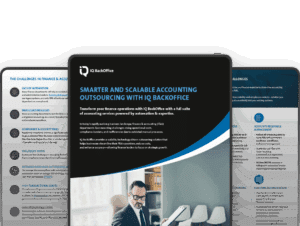What is Offshore Accounting?
Why do businesses decide to offshore accounting services?
Businesses often use offshore accountants to reduce costs, as wages and operating expenses may be lower in other countries. It can also provide access to specialized expertise or allow businesses to tap into new markets.
However, offshore accounting can also be complex and subject to different regulations, tax laws, and reporting requirements. It is vital for businesses to carefully consider the potential risks and benefits of offshore accounting and ensure that they have a clear understanding of the legal and regulatory requirements in the countries where they operate.
10 Benefits of Offshoring Accounting
1. Offshore Accounting Generates Cost Savings
One of the main reasons businesses opt for offshore accounting services is to save costs. In-house accounting teams are increasingly expensive and difficult to find and retain. Offshore accountants often have lower overhead costs and can offer better pricing. This can result in significant cost savings for businesses. For example, a study by the Global Sourcing Association found that companies can save up to 60% on accounting costs by utilizing offshore accountants (Worthington, 2014).
2. Access to specialized expertise
3. Improved efficiency
4. Increased focus on core business activities
5. Compliance with local laws and regulations
6. Improved data security
7. Flexibility
8. Language proficiency
9. Time zone differences
10. Cultural understanding
Are there risks in Offshoring Accounting?
While there are many benefits to offshore accounting, businesses need to consider the potential risks as well. One key risk is the potential for regulatory or legal challenges, as different countries may have different laws and requirements for accounting and financial reporting. Businesses need to ensure that they have a clear understanding of the legal and regulatory requirements in the countries where they operate and to have systems in place to ensure compliance.
Another risk of offshore accounting is the potential for language barriers or cultural differences to impact communication and collaboration. For example, suppose a business utilizes accountants in another country. In that case, it will help to have an understanding of cultural differences to facilitate communication.
Other Challenges that might come with Remote Accounting
Offshore accounting can also be more complex from an organizational standpoint, as it may involve managing teams in multiple locations or coordinating work across different time zones. This can require careful planning and collaboration tools and technologies to ensure that tasks are completed efficiently.
One potential challenge of offshore accounting is the risk of data security and privacy breaches. This is particularly relevant in today’s digital age, as businesses often rely on technology and the internet to complete accounting tasks and access financial data. Businesses must implement robust security measures to protect sensitive financial data and ensure compliance with relevant laws and regulations.
Another risk of offshore accounting is the potential for fraud or financial mismanagement. This can be particularly challenging for businesses that outsource accounting tasks to third-party providers, as it may be more difficult to monitor and verify the accuracy of financial reporting and other tasks. It is important for businesses to vet potential providers carefully and have systems in place to detect and prevent financial mismanagement.
Conclusion
Offshore accounting can be a valuable tool for businesses looking to reduce costs, access specialized expertise, or tap into new markets. Still, it is essential to consider the potential risks carefully and ensure that all legal and regulatory requirements are met. It may be helpful for businesses to seek the advice of an accountant or financial professional with experience in offshore accounting to help ensure a smooth and successful transition.
Are you looking for a dedicated, remote Accounting Team? IQ BackOffice can help.
Here at IQ BackOffice, we build remote, offshore accounting teams that work as an integral part of our clients’ operations. We offer the best global talent at cost-effective rates so you can enhance your financial operations and achieve your goals faster. We help you do everything needed to build a team, from helping you design a strategy to recruiting, setting up interviews, onboarding your team, providing infrastructure and ongoing administration.
IQ BackOffice will meet with you to understand your business goals and the requirements for each position and then find the perfect candidates to join your team. We build dedicated teams exclusive to your account that we provide with the infrastructure and tools to work effectively with you. Lastly, we handle the administrative aspects of your team – payroll, HR, etc., so you never have to. All for 1 simple monthly fee.
Contact IQ BackOffice today to learn more about building an effective Global Accounting Team.












